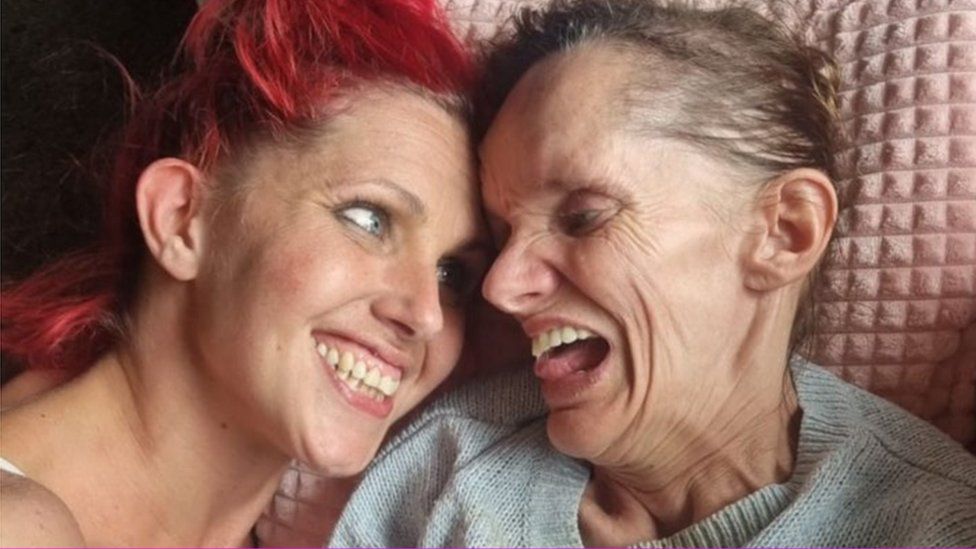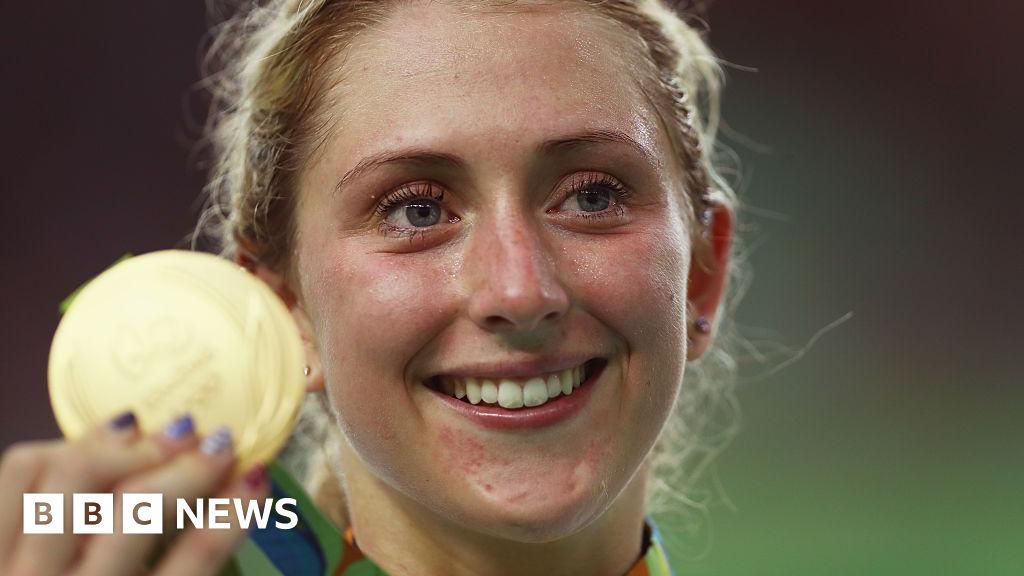 Image source, Penny Taylor
Image source, Penny Taylor
Penny Taylor says she does not know if she will get the disease like her mother Liz
By Sharon Barbour
Health Correspondent, BBC Look North
Neuroferritinopathy is a rare brain condition that traps people in their bodies and seems to largely affect descendants of one family. As a university launches a drugs trial in a hope of reversing its effects, the BBC spoke to the family of four sisters diagnosed with the disease.
Liz Taylor was a fit 38-year-old when she found out she was going to lose her ability to walk, talk and even eat.
She had pain in her hands which, after weeks of tests, doctors in Newcastle told her was a neurological disease for which there was no cure.
"I remember when she ran upstairs crying," her daughter Penny, who is now also 38, recalls.
Liz's husband James, 62, has had to watch helplessly as his wife's health deteriorated.
Liz Taylor is unable to walk, talk or eat
Now aged 59, Liz is trapped in her own body.
Her mind is still fully active but James can only communicate with her by reading the expressions in her eyes.
The following years brought more devastating news for the family as each of Liz's three sisters were diagnosed with the same condition.
It turned out it was a genetic disease no-one in the family from Rochdale, Greater Manchester, knew anything about.
Image source, Family handout
Image caption,James and Liz Taylor, pictured when they were younger
Scientists believe there are only about 100 patients in the world with the condition, and the majority come from the same family line in Cumbria.
Often misdiagnosed as Parkinson's or Huntington's disease, scientists discovered it was in fact a new condition and named it neuroferritinopathy, as it is caused by a build-up of iron in the brain.
They found a genetic fault meant the iron was getting into the brain, but could not get out.
'Living in a shell'
A trial at Cambridge University will test if an existing drug can be repurposed to draw out the iron, and halt, reverse or possibly even "cure" some patients.
It offers a glimmer of hope for Liz and her sisters, including 61-year-old Heather Gartside.
Image source, Family handout
Image caption,Stephen and Heather Garside, pictured when they were younger
Her husband Stephen, 59, says she too can understand everything going on in the world around her, but cannot communicate.
She can barely move and can no longer talk.
"We'd seen Elizabeth deteriorate, and we just knew that it was going to be life-changing," says Stephen, who is now his wife's devoted carer.
Heather has also been diagnosed with neuroferritinopathy
He asks her if she can help him find the words to describe how hard it is, but she cannot answer.
Looking at Liz, James says: "It must be frustrating to live in that shell."
The disease was only discovered by scientists in Newcastle after they saw an increasing number of patients from Cumbria.
Image source, Getty Images
Image caption,Common ancestry could be shared with Fletcher Christian, known for leading the mutiny on the Bounty in 1789
Professor Sir John Burn, from Newcastle University, who named the disease, discovered almost all known cases were likely to be descended from the same ancestor.
He traced it back to the 18th Century in Cockermouth, Cumbria, and families with the surname Fletcher.
Investigations have also taken place to see if they could have shared common ancestry with Fletcher Christian (Fletcher being his surname), known for leading the mutiny on the Bounty in April 1789, given he was also from the region, but that evidence remains unclear.
'A potential cure'
Now, nearly 25 years since the condition was recognised, neurology professor Patrick Chinnery from the University of Cambridge is about to start a year-long trial of an existing drug, deferiprone, which he hopes will be able to "pull out the iron from the brain" and halt the disease in its tracks.
"Scans show where the iron is collecting in the brain, and in people who've inherited this genetic change it's really marked," Prof Chinnery says, adding: "It can take 40 years before people start to get symptoms."
Image source, Family handout
Image caption,Sisters Liz and Heather both went on to be diagnosed with neuroferritinopathy
After patients have had symptoms for 10 years, the excess iron is "clearly causing damage to the brain itself and the supporting tissue has been destroyed", Prof Chinnery explains.
"Our primary aim is to stop the disease in its tracks, and it might lead to some reversing of the problems."
The trial was approved by the Medicines and Healthcare Products Regulatory Agency (MHRA) in February.
It is being supported by the LifeArc Rare Diseases Translational Challenge, which has contributed £750,000 towards it.
"Drug repurposing trials are an increasingly effective way of taking treatments that have already approved and applying them to new conditions and diseases," says Dr Catriona Crombie, from LifeArc.
If the trial is successful, Prof Chinnery says all doctors may be able to give it to people before they develop any symptoms at all.
He says, for these patients, that means "a potential cure".
The sisters are being cared for by their families
He also says it could pave the way for treating other conditions linked to the build-up of iron in the brain
"If we can show in this condition that reducing iron stops the nerve cells being damaged, it is not a big jump to suggest a similar approach might be helpful in Parkinson's disease or Alzheimer's disease," he adds.
'I try not to think about it'
The trial of deferiprone brings hope where there was none, that an effective treatment may be possible.
Liz's daughter Penny helps look after many in her family but does not know if she has the disease.
"I try not to think about it," she says, adding: "If you think about it, then I believe it'll come on faster."
Penny Taylor helps to look after her family members
She says she worries about building her hopes up about the trial success, but adds for her and her family "it would mean everything".
Heather's husband Stephen agrees, adding: "If it slows it down - that's a win, she's not going to deteriorate. If it can cure it - fantastic, absolutely wonderful.
"It just means so much, doesn't it?" Stephen says, looking at his wife.
Related Internet Links
The BBC is not responsible for the content of external sites.
 (1).png)
 9 months ago
14
9 months ago
14













